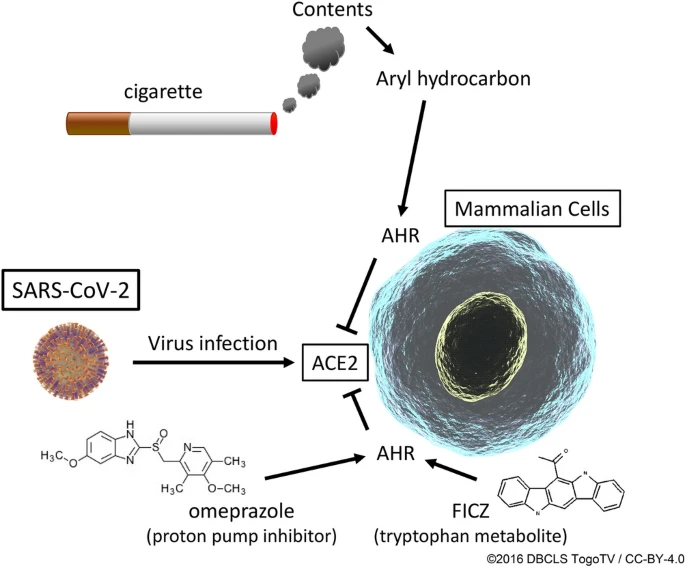 Since understanding molecular mechanisms of SARS-CoV-2 infection is extremely important for developing effective therapies against COVID-19, we focused on the internalization mechanism of SARS-CoV-2 via ACE2. Although cigarette smoke is generally believed to be harmful to the pathogenesis of COVID-19, cigarette smoke extract (CSE) treatments were surprisingly found to suppress the expression of ACE2 in HepG2 cells. We thus tried to clarify the mechanism of CSE effects on expression of ACE2 in mammalian cells. Because RNA-seq analysis suggested that suppressive effects on ACE2 might be inversely correlated with induction of the genes regulated by aryl hydrocarbon receptor (AHR), the AHR agonists 6-formylindolo(3,2-b)carbazole (FICZ) and omeprazole (OMP) were tested to assess whether those treatments affected ACE2 expression. Both FICZ and OMP clearly suppressed ACE2 expression in a dose-dependent manner along with inducing CYP1A1. Knock-down experiments indicated a reduction of ACE2 by FICZ treatment in an AHR-dependent manner. Finally, treatments of AHR agonists inhibited SARS-CoV-2 infection into Vero E6 cells as determined with immunoblotting analyses detecting SARS-CoV-2 specific nucleocapsid protein. We here demonstrate that treatment with AHR agonists, including FICZ, and OMP, decreases expression of ACE2 via AHR activation, resulting in suppression of SARS-CoV-2 infection in mammalian cells.
Since understanding molecular mechanisms of SARS-CoV-2 infection is extremely important for developing effective therapies against COVID-19, we focused on the internalization mechanism of SARS-CoV-2 via ACE2. Although cigarette smoke is generally believed to be harmful to the pathogenesis of COVID-19, cigarette smoke extract (CSE) treatments were surprisingly found to suppress the expression of ACE2 in HepG2 cells. We thus tried to clarify the mechanism of CSE effects on expression of ACE2 in mammalian cells. Because RNA-seq analysis suggested that suppressive effects on ACE2 might be inversely correlated with induction of the genes regulated by aryl hydrocarbon receptor (AHR), the AHR agonists 6-formylindolo(3,2-b)carbazole (FICZ) and omeprazole (OMP) were tested to assess whether those treatments affected ACE2 expression. Both FICZ and OMP clearly suppressed ACE2 expression in a dose-dependent manner along with inducing CYP1A1. Knock-down experiments indicated a reduction of ACE2 by FICZ treatment in an AHR-dependent manner. Finally, treatments of AHR agonists inhibited SARS-CoV-2 infection into Vero E6 cells as determined with immunoblotting analyses detecting SARS-CoV-2 specific nucleocapsid protein. We here demonstrate that treatment with AHR agonists, including FICZ, and OMP, decreases expression of ACE2 via AHR activation, resulting in suppression of SARS-CoV-2 infection in mammalian cells.
広島大学の研究チームは、新型コロナウイルス(SARS-CoV-2)がヒトに感染する際に利用する受容体の構成タンパク質の1つである「ACE2」の発現がタバコの煙成分によって低下することや、それが芳香族炭化水容体(AHR)を介して低下すること、およびその機構と関与する化合物を明らかにしたと発表した。























